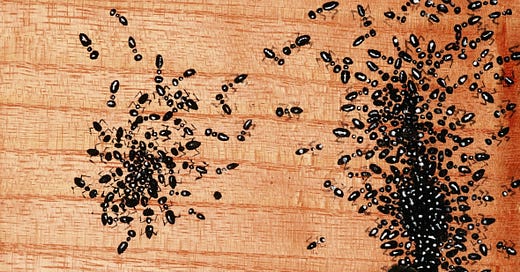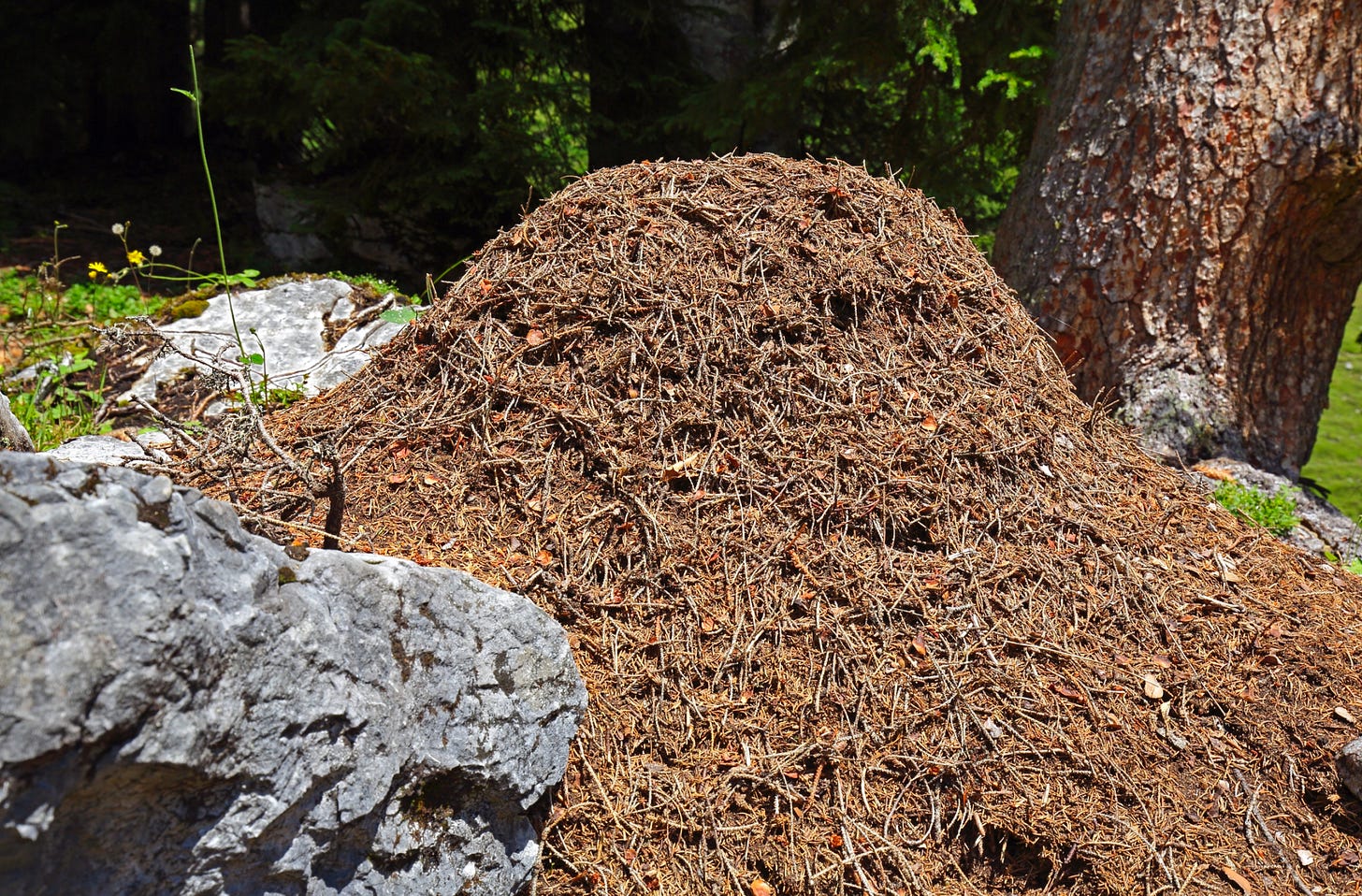Marching Ants, Solo Escapades, & Friend Groups as Human Colonies
Towards a shared, unshared consciousness.
When people ask why I have a tattoo of an ant, I usually say, simply, “because I like ants.”1 This is true, but it’s also a cop out. I tend to omit the real answer, which includes why I like ants.
Aside from their unthreatening presence—due mostly to their diminutive size compared to some other insects—I’m drawn to ants because they’re community-minded creatures. The only other trait they are equally known for is working hard, but this I can find in many other species. I like to think that if humans lived like ants, our existence would be (almost) utopian.
Of course, ants aren’t perfect. Most species have a kind of caste-system with designated roles and responsibilities. These hierarchies (that I so despise) seem to benefit ants far more than they benefit people. Ants have found success under systems that consistently fail humans (but that we consistently try and try again anyway).
Perhaps my fascination with ants isn’t so unique. Take the popular children's rhyme, whose first verse is as follows:
The ants go marching one by one, hurrah hurrah
The ants go marching one by one, hurrah hurrah
The ants go marching one by one
The little one stops to suck his thumb
And they all go marching down to the ground
To get out of the rain, boom, boom, boom
“The Ants Go Marching” was adapted from an American Civil War song called “When Johnny Comes Marching Home” about a loved one’s return from war. So you see, the tendency to anthropomorphize ants2 isn’t exclusive to me.
It’s a rather peculiar tendency. Superorganisms work for the wellbeing of their entire colony—something humans (even in collectivist societies) have yet to achieve. But from Aesop’s fables to A Bug’s Life, ants have held their relevance in the global consciousness. Besides their ubiquity, maybe it's the fact that ants are so altruistic (yet so functional) that makes us—seeing some unfulfilled potential in ourselves—so interested in them.
Ants are also, by my metric, pretty intelligent. They can learn to recognize patterns, exercise self-control, and course-correct after making mistakes. I’ve only mastered one of these abilities.
Ants have various “personalities,” the term researchers use to measure their aggressiveness, propensity for exploration, activity level, boldness, hygiene, and niche construction among other characteristics. While ants may have their own distinct personalities, these ones refer to trends within entire colonies. Still, sometimes I think of individuals as existing on these aforementioned axes.3
On a recent outing with a friend (exploratory ant?), he casually told me that, in a bout of depression during the semester, he’d decided to bike from his college campus in Indiana to his former host family’s apartment in Connecticut (“marching” home).
He prepped a backpack, bought a sleeping bag (and a tarp),4 and stole a bike from atop a tree.
He went riding mile by mile (hurrah, hurrah) on desolate highways and through an (also desolate) old-timey town. Apparently you can ride for miles and miles without a change of scenery in Indiana, so the old-timey town was a welcome aberration.
This went on for a couple days before—a few hundred miles later, weathered by his (rain-soaked) nights outdoors and finding himself only at the edge of the state—he decided it was a futile endeavor, left his bike on the side of the road, and bought a train ticket for the remainder of the way back to CT.5
You might be entertained by this journey. Or maybe you’re more concerned. In any case, he said the trip cured his depression. I’m not sure what ails me, but his story made me want to get on a bicycle and find its cure.
I tend to oscillate between introversion and extroversion (leaning towards the former), so the extent of my desire to indulge in a solo adventure a-la Jack Kerouac is volatile (tending, however counterintuitively, toward the lower end).6
As far as we know, there are no solitary ants. This gives me great satisfaction. As much as I’d like to think I’d enjoy a trip alone with only my own thoughts to occupy me, I think only being with other people could save me from the kind of emotional low my friend (exploratory ant, E.A. for short) was experiencing. The attachment this reveals would suggest I’m quite far from achieving Nirvana, but that’s fine by me.
The smallest ant colonies start with as few as ten to twenty ants. There are five of us (soon to be six) in my suite. I don’t know what the ideal colony-size is for humans, but ant colonies can contain billions of ants acting in concord. I do not think humans share this capacity for large-scale cooperation.7 I’m happy with my four colleagues of C31 (soon to be five colleagues of H23). (In keeping with Dunbar’s number,) I wouldn’t go beyond fifteen.
(A super colony of ants)
Some scholars have argued that ants “think like computers,” processing pheromones like an AI might interpret various inputs. I wonder if it’s that simple. If it is, I think it would be difficult for humans—with all our bugs (but not ant-like bugs)—to replicate these systems of unity. I wonder, also, if the ants in a colony understand each other wholly, engaging in a kind of group-think that I could actually get behind. But the more enticing possibility is that they do have their own individuality, distinct from total oneness with each other. And that regardless, they still work towards (and achieve) a harmonious existence.
There are 2.5 million ants for every living human on earth. Often, the sheer number of people on earth is mentioned to evoke a kind of smallness—an insignificance—of each individual. I’ve sometimes heard the ant-to-human ratio invoked with an ominous underpinning, like each ant is a harbinger for some great power that defies human comprehension. Whether or not these two perspectives complement or contradict each other is up for debate. The point is that our speck-of-sand-ness might make us (individually) unremarkable, but it makes Us (together) all the more important.
The kind of ant behavior I most hope for society to achieve—communalism—is embodied already in most of the people I love. Just from this summer, I think of many such expressions of community: late night conversations with my (school year) suitemate long after the night had died down and our other friends had dispersed, never cut short by a suggestion that I had overstayed my welcome in her (summer) dorm.8 Helping a friend dye her hair, and her helping me dye mine, and our two other friends simultaneously helping the both of us for no other reason than to enjoy our company. My best friend and I road-tripping to Rhode Island—except that I can’t drive so she transported us to (and within) and from the state with no complaints. E.A. cycling alone for days on end without feeling lonely but never refusing when I asked to catch up.9
At this small scale, on an interpersonal level, humans can be quite like ants.
But despite the cooperative spirit that ants are known for, “The Ants Go Marching” recognizes a sort of singularity that I’m inclined to believe in despite my distaste for (philosophical) solipsism. Ants may be particularly group-oriented, but like us, they walk through life “one by one.”
Someday, I hope we humans might learn how to reconcile this selfhood with the collective identities we (deftly) create (and clumsily cherish) in our own communities.
this is more often than not a satisfactory answer, but sometimes I get a joke about how I’m small (like an ant), which annoys me to no end.
or rather to zoomorphize humans and then anthropomorphize those animals (into thumb-sucking children).
curiosity (exploration), sloth (activity level), boldness, hygiene, and ability to influence (niche construction).
as he proclaimed in the middle of the night to the police officer who told him he couldn’t sleep out in the rain next to someone’s farm.
i.e. he stopped, but not to suck his thumb.
it’s also probably less safe an idea for a woman :(
though most politicians would disagree with me to some extent.
even when the early hours of the morning had (more than) arrived.
even though most of my friendships forged in high school have only grown closer, I sometimes worry (against my better judgment) that my high school friends will tire of their high school friendships.




